On this page you can read the experience of participants from a variety of the activities and retreats that have been organised by SanghaSeva since 2004. If you have been on one of our retreats we would love to hear from you again please share your experience with us
Volunteering at Anandwan, Forest of
Joy
by Dave Adair
"The good you do today, it will not last. Do good anyway.
If you give the best you have, it will never be enough. Give your best anyway."
~ made famous by Mother Teresa (edited)
"I sought my soul, but my soul I could not see.
I sought my God but my God eluded me.
I sought my brother and I found all three."
~ source unknown; the favorite quote of Baba Amte, founder of Anandwan
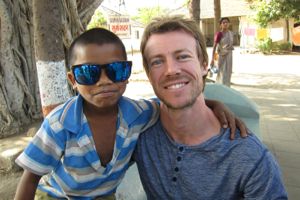 Steve Martin used to begin his live comedy show with "I like to start the show by doing something impossible:
I'm now going to suck this piano through this straw." Today's impossible feat: I will now describe to you what it's like to volunteer at a mostly-leprosy community in central India. As I write these letters I always hope to provide
some kind of full accounting of an experience, and it's never looked as hopeless as it does right now. Volunteer work of this sort has a way of stretching you, finding your edges, building great walls around your comfort zone, and
then watching those walls crumble, brick by brick. The subtle-me says you can't even accurately describe the experience of sipping a cup of tea. Caring for wounds of leprosy patients? Why do I even try...
Steve Martin used to begin his live comedy show with "I like to start the show by doing something impossible:
I'm now going to suck this piano through this straw." Today's impossible feat: I will now describe to you what it's like to volunteer at a mostly-leprosy community in central India. As I write these letters I always hope to provide
some kind of full accounting of an experience, and it's never looked as hopeless as it does right now. Volunteer work of this sort has a way of stretching you, finding your edges, building great walls around your comfort zone, and
then watching those walls crumble, brick by brick. The subtle-me says you can't even accurately describe the experience of sipping a cup of tea. Caring for wounds of leprosy patients? Why do I even try...
We're staying at the lovely oasis, of sorts, of Anandwan, which means Forest of Joy. It was founded by the bigger-than-life Baba Amte, a compatriot of Gandhi, who was born wealthy and had unending luxurious alternatives laid before him. As a fearless young man fighting the British for independence, he found himself fleeing from the horror of the "living corpse" of a dying leper. He was shaken to the core by his reaction, and after returning and caring for the leper's last three days on earth, he resolved to dedicate his life to the care and empowerment of India's lepers. This place is built on principles of dignity, equality, hard work, and the intrinsic value of humans, regardless of their status, wealth, or number of fingers. "Work builds, charity destroys" is a core Baba Amte principle.
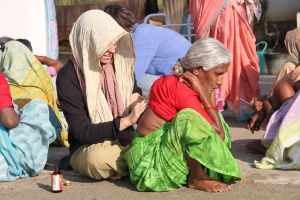 There are 18 of us volunteering, including the two retreat organizers, and we're working two shifts a day, for two
or three hours each. Among the many possible roles, most of us have chosen between wound care, playing with the deaf and/or blind kids, and giving massage and attention to the people in the old folks home. Inexplicably, I've chosen
to start the day with dressings wounds, waking at 5:30 a.m., roughly four hours earlier than my normal get-up-ya-lazy-bastard wake-up time. In the afternoon a group of us are taking mostly old folks out on wheelchairs trips to the
grave site of Baba Amte and his wife.
There are 18 of us volunteering, including the two retreat organizers, and we're working two shifts a day, for two
or three hours each. Among the many possible roles, most of us have chosen between wound care, playing with the deaf and/or blind kids, and giving massage and attention to the people in the old folks home. Inexplicably, I've chosen
to start the day with dressings wounds, waking at 5:30 a.m., roughly four hours earlier than my normal get-up-ya-lazy-bastard wake-up time. In the afternoon a group of us are taking mostly old folks out on wheelchairs trips to the
grave site of Baba Amte and his wife.
A continuing theme on the retreat, and our biggest struggle: what really helps? What's the "best" thing to do? How could I be most useful? The short non-answer: it's helpful that we're here, mostly for the message that the lepers and other outcasts are worthy of our time, attention, and love; AND we're doing very little that will have any kind of lasting impact. That's way too simple a summary, but there was a long discussion group on this topic last night, and it's not going to be summarized in a sentence or two. (But the retreat's happening again next December, and you're welcome to join and figure it out for yourself!)
 I'm treating wounds under the direction of "Mousie," a lovely and healthy leper with permanently bent
fingers, at the old folks home. Mousie doesn't speak a word of English, but that doesn't stop her from talking to me in Hindi or Marathi, the local language. At first I felt incompetent and useless, but now that I'm getting better
at applying bandages, I'm only feeling useless. Mousie lives here, has for years, and will be dressing these wounds six or seven days a week until she's too old to continue. Soon enough I'll be laying on a beach somewhere complaining
about the cost of airfare to some other exotic location. She doesn't need me. At the same time, she seems happy that I'm there, and we've developed a smooth work relationship. The giant burn the length of one woman's thigh is too complicated
for me, so I mostly watch, but when someone comes in with a deep but clean wound that covers a quarter of the sole of their foot, she motions with her finger slightly to indicate what to do.
I'm treating wounds under the direction of "Mousie," a lovely and healthy leper with permanently bent
fingers, at the old folks home. Mousie doesn't speak a word of English, but that doesn't stop her from talking to me in Hindi or Marathi, the local language. At first I felt incompetent and useless, but now that I'm getting better
at applying bandages, I'm only feeling useless. Mousie lives here, has for years, and will be dressing these wounds six or seven days a week until she's too old to continue. Soon enough I'll be laying on a beach somewhere complaining
about the cost of airfare to some other exotic location. She doesn't need me. At the same time, she seems happy that I'm there, and we've developed a smooth work relationship. The giant burn the length of one woman's thigh is too complicated
for me, so I mostly watch, but when someone comes in with a deep but clean wound that covers a quarter of the sole of their foot, she motions with her finger slightly to indicate what to do.
I'm probably at risk of objectifying some of the patients, but damn, these are some cute grandmas. One lady is about four feet tall and her foot looks about the size of the palm of my hand. There's a one-legged no-fingered two-toed lovely with an artificial leg who's full of life and has a sassy grin. I think in a parallel universe somewhere we're dating. I don't know how the relationship is going but I wish them well. The least attractive of the leper ladies, a hard fought contest to be sure, is one of my favorites. She has a snaggle-toothed grin with random missing teeth, no fingers, and she can't stop drooling for some reason - but she has such a lovely and gentle way about her. I said in the last letter that I was dealing with a mix of love and revulsion. As I thought might happen, when you get used to the wounds they seem less important, and it's easier to see the residents not as lepers who need help, but as people. It's amazing what they are able to do, but like old folks everywhere, they can use a helping hand.
 If you do come next year, which I expect, (just say yes,) what I've written above may not be your first impression.
There is some incredible suffering on display here. As Dr. Vikas, the son of the founder told us the other night, the mission of the organization is to close this place. Virtually no one comes here to live by choice. They've come because
they've run out of choices. Lepers are still shunned by society and forced to leave their homes and villages. As he put it, "It's a social catastrophe that brings us here."
If you do come next year, which I expect, (just say yes,) what I've written above may not be your first impression.
There is some incredible suffering on display here. As Dr. Vikas, the son of the founder told us the other night, the mission of the organization is to close this place. Virtually no one comes here to live by choice. They've come because
they've run out of choices. Lepers are still shunned by society and forced to leave their homes and villages. As he put it, "It's a social catastrophe that brings us here."
So on this Christmas Eve, you have much to be thankful for. May you recognize it. Eyes to see, a roof over your head, food, friends, your health. And fingers to join together in a "namaste," the traditional Indian greeting that means I recognize the divine in you.
Too much love, hardly any revulsion!
- Originally published at blog.DaveAdair.com follow the link for outstanding photos from the retreat.
During this retreat in Israel and Palestine we were asked by people from the village of Deir Istya to help a farmer harvest his olives. We were happy to help, but when we got there we could see that for many months the raw sewage from the settlement had been dumped a few terraces above his land and was seeping into his terraces. So we harvested olives surrounded by human waste.
This seems something impossible to imagine, so we want to share some pictures and words.
Click here for a report of the situation.
Being Peace Reflections

by Alessandra Pigni
"Whether we sit with our arms folded this way and our legs crossed that way is of little consequence. But it is extremely important to check and see if whatever meditation we do is an actual remedy for our suffering."
Lama Yeshe
Rain has come to the 'Holy Land' which means that the olive harvesting season is over. In October I spent two weeks on an engaged meditation project, practicing mindfulness, as well as being out in the field (literally), climbing trees,
picking fruits that sometimes were just out of reach, and most importantly offering international protection to farmers whose olive groves are in sensitive areas. Israelis, Palestinians and internationals worked side by-side, we shared
meals and stories, we experienced silence and the beauty of nature in what remains a tense conflict area.
After two weeks of intense physical labour, very early rises, and strong emotional engagement in a complex political situation, where suffering springs from both sides, and solutions at times seem elusive, I found myself still full of
energy and surprisingly not physically and psychologically drained. I think that the key here has been self-care, and peer support. Each one of us in the group allowed for time and space to just be, relax and refuel, with no agenda
other than being here. 'Be gentle first with yourself – if you wish to be gentle with others',
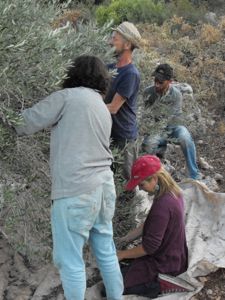 Lama Yeshe, a great Tibetan teacher said. Self-care comes in different forms, and to incorporate simple nurturing
body-mind practices in our active and socially engaged daily life is a way to provide a beautiful frame to a picture that encompasses stress, difficulties, and life's ups and downs. What Jon Kabat-Zinn, founder of the Mindfulness-Based
Stress Reduction programme, calls 'the full catastrophe of life'.
Lama Yeshe, a great Tibetan teacher said. Self-care comes in different forms, and to incorporate simple nurturing
body-mind practices in our active and socially engaged daily life is a way to provide a beautiful frame to a picture that encompasses stress, difficulties, and life's ups and downs. What Jon Kabat-Zinn, founder of the Mindfulness-Based
Stress Reduction programme, calls 'the full catastrophe of life'.
I was lucky to work with a group of like-minded people who felt that the time we devote to reflection before action is gold. The simple act of sitting still in mindful meditation, practising yoga, going for a walk in nature whilst paying
attention to what moves inside us, finding with others in silence and in words the deeper meaning of our actions and of our engagement in the world, created a beautiful container for our work to be effective. It is useful to shift
our humanitarian work paradigm: rather than viewing self-care as an indulgent waste of time, it is what keeps us sane, especially in a highly stressful and emotionally charged context. It is what helps us to relate to difficulties
in a different way, noticing what triggers us, and being able to respond skillfully to stressful events. Self-care helps to keep a happy mind and to prevent burnout and falling prey to the exhaustion funnel vicious circle. On top of
that I can genuinely say that the quality of the work that emerged from that sense of being present was marvelous.

Every morning we spent time meditating together, some practised yoga, others went for a quiet walk, others at times preferred to sleep in taking up the Dalai Lama's advice that 'sleeping is sometimes the best form of meditation'. These simple acts of opening up the space within to cultivate a sense of peace set the tone for the day in the field, where many of us did our best to bring that attitude of 'being peace' to the work, to the activities, and to the relations that we met throughout the day, opening the door to pleasant and unpleasant situations as they emerged. And believe me, in this land the air is charged with tension and suffering, and shutting off unpleasant events is not an option.
From this simple experience of mindfulness in action, it is clear that meditating does not mean becoming numb. It does not mean being emotionally flat and disengaged. Research carried out at Harvard shows that regular meditators
 have a heightened sensitivity and emotional involvement compared with non-meditators (Kabat-Zinn, 2009). For
me mindfulness simply means being aware of who we are, and being open to what unfolds moment after moment, day after day, without being harsh on ourselves for never being good enough. It means accepting myself and others without striving
for perfection.
have a heightened sensitivity and emotional involvement compared with non-meditators (Kabat-Zinn, 2009). For
me mindfulness simply means being aware of who we are, and being open to what unfolds moment after moment, day after day, without being harsh on ourselves for never being good enough. It means accepting myself and others without striving
for perfection.
I think that activism and NGOs need more people who are able to cultivate mindfulness. At the same time the 'mindfulness movement' can greatly benefit from people who want to take their practice into society, with passion and without fear of engaging with the chaos of the world.
- This reflection was also posted on MindfulnessForNGOs.org
A nature reserve in the Palestinian occupied territories. Complexity upon complexity.
On the 30th April rain fell on Deir Istya and we reluctantly had to accept that we would not be planting trees that day. As a compensation the Mayor offered to take us and the group of predominantly Israeli volunteers with us to Wadi Qana. We were there as part of the Being Peace weekend retreat, an opportunity for Israelis to "meet the neighbours". Hopefully forging new friendships and initiatives for peaceful co-existence, whether in two states or one. But definately to see and feel the occupation, and get to know what it means for us all.
Wadi Qana is a beautiful valley with a stream running through. The citrus groves and agricultural fields owned by the Palestinians from near by villages are surrounded by settlements on the hilltops almost 360º around.
Click here for a report of the situation.
by Susie Jones
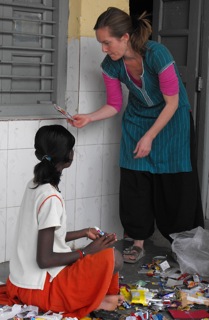 A little girl about six years old pulls at my shirt to get my attention. She points her fingers to her eyes and
then to me. She is deaf and this was a sign that said, "Look". Then she started a series of hand signs and of course I was completely lost. She saw my confusion and stopped, and then began again more slowly. This time I realised
she was going through the alphabet and was intent on teaching it to me right away so that we could exchange names. As I fumbled to get the hand positions right and kept forgetting letters she took my hands and showed me how they should
be. This teacher has patience and gentleness in abundance.
A little girl about six years old pulls at my shirt to get my attention. She points her fingers to her eyes and
then to me. She is deaf and this was a sign that said, "Look". Then she started a series of hand signs and of course I was completely lost. She saw my confusion and stopped, and then began again more slowly. This time I realised
she was going through the alphabet and was intent on teaching it to me right away so that we could exchange names. As I fumbled to get the hand positions right and kept forgetting letters she took my hands and showed me how they should
be. This teacher has patience and gentleness in abundance.
These are not isolated moments at Anandwan, these touching encounters fill the days. The place is a hive of activity, everyone is doing something, working, participating
in community life. There is action without effort, working to share & create harmony. It begins to seem quite normal until you remember, hang on a minute, that woman weaving the most beautiful, intricate carpet cannot see the colours
she is so skillfully using for she is blind. That man making special sandals that protect these vulnerable leprosy feet has no sensation in his feet himself. That couple in the tree nursery caring for the delicate saplings have hands
that no longer can completely feel the tender leaves. Everything is made here by the people who live here – the mattress on my bed, the bed frame too, the amazing food I eat, the milk
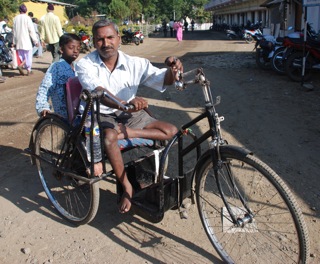 for the tea, the special tricycles designed to help leprosy patients get around. Some of the gas used for cooking
comes from the treatment of sewage, all plastic is recycled, shredded and used in building, the water is treated & recycled, rainwater is harvested. And it goes on and on. The people here are treading lightly on this earth with
their wounded feet.
for the tea, the special tricycles designed to help leprosy patients get around. Some of the gas used for cooking
comes from the treatment of sewage, all plastic is recycled, shredded and used in building, the water is treated & recycled, rainwater is harvested. And it goes on and on. The people here are treading lightly on this earth with
their wounded feet.
Leprosy as a disease still remains a bit of a mystery, it is a bacteria that you can catch like TB, it is only found in humans and is one of the oldest known diseases to man. It is completely curable. Nathan
said if you look around Anandwan and try to see what could be the common factor amongst leprosy patients, the thing you find is "loveliness". There is loveliness here. Maybe being lovely is what is needed to overcome leprosy,
to handle being rejected by society, to gain a sense of dignity and self-respect.
-:-:- click button again to hide -:-:-
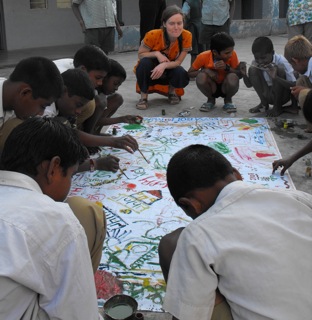 There are no victims here and no place for pity. One man said that they don't spend their time thinking
about what they don't have or what they have lost but rather focus on all they do have and on everything they are able to give. This just about sums it up. People here have taken their pain and suffering and transformed it.
It reminds me of the words of those that have survived imprisonment like Victor Frankl and Nelson Mandela. They speak about one freedom nobody can take away from us - to choose the way we perceive life, to choose our attitude
to each moment that is before us. When faced with challenge and difficulty do we choose to let it get us down, to feel victimised, to feel life has somehow treated us unfairly? Or do we choose to see the opportunity that lies
within it, the lessons that are there for us to learn, the way that suffering can lead us to touch our beautiful humanity and feel the healing power of love? To feel like rather than questioning life, we see how life questions
us in each moment. The people of Anandwan have made their choice and I feel extremely blessed to be here to feel, see, hear & sign language it!
There are no victims here and no place for pity. One man said that they don't spend their time thinking
about what they don't have or what they have lost but rather focus on all they do have and on everything they are able to give. This just about sums it up. People here have taken their pain and suffering and transformed it.
It reminds me of the words of those that have survived imprisonment like Victor Frankl and Nelson Mandela. They speak about one freedom nobody can take away from us - to choose the way we perceive life, to choose our attitude
to each moment that is before us. When faced with challenge and difficulty do we choose to let it get us down, to feel victimised, to feel life has somehow treated us unfairly? Or do we choose to see the opportunity that lies
within it, the lessons that are there for us to learn, the way that suffering can lead us to touch our beautiful humanity and feel the healing power of love? To feel like rather than questioning life, we see how life questions
us in each moment. The people of Anandwan have made their choice and I feel extremely blessed to be here to feel, see, hear & sign language it!
I have been asking myself these last few days if maybe I have died and
arrived in heaven – if this place really does exist on earth then paradise is within our reach.
The last week at Anandwan was particularly moving, not least as it meant saying goodbye or farewell to many wonderful souls.
We spent Christmas day in silence taking rest from our work duties and alternating sitting and walking
meditation. These silent days have been necessary to allow all the experiences to settle, all the emotions, thoughts and feelings to be acknowledged and held in quiet attentive space. A time and place to connect with all that
has been happening in the inner life. As I sat by the lake watching the sun descend, an old man came and sat down beside me. He began to talk and tell me he had been in Anandwan for over 30 years and that three years ago his
wife had died, defeated by cancer. As I sat and listened he told me that a simple life was a good life, free from unnecessary worries, and that happiness is to be found inside and not outside. He repeated, "Happiness is
inside". We shared some silence and watched the birds. The homes for the elderly in Anandwan are called "Wisdom Banks" – very appropriate!
Anandwan has an amazing gentle power of opening us up, of revealing vulnerability and tenderness, of coming face to face with those parts of ourselves we'd rather not see, and then teaching us how to approach these parts softly
with kindness, to befriend and embrace them and listen. Ultimately, the hard edges of protection & pain around the heart are slowly dissolved and healed. As Zohar said, the love of Anandwan fills our lives.
I am blessed
to have received such a gift at the end of a special year, and I know that my self, my heart and my life will never be the same again.
Poem from Anandwan
by Ian Lindsay
Can you run your thumbs along the coldness in my heart,
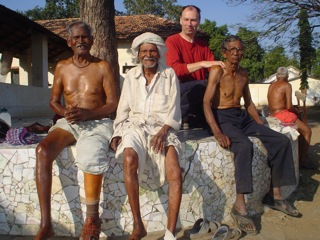
Give pressure on the frozen flesh,
Oil slowly easing the tightness, the discomfort, the pain.
Receiving the massage and the message that you are good enough,
That I am good enough.
Noticing the tenderness, the soreness.
Skating tightly across the missing parts
Without making an impression.
Who am I ?
And who are you
With your scars and lines ?
Is this a connection through the giving and taking of warmth ?
Moving across textures of skin,
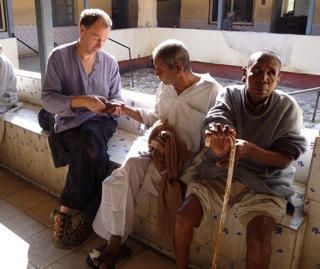 Fragile silky tissue, dry and cracked like mud, open and smooth like a buffalo.
Fragile silky tissue, dry and cracked like mud, open and smooth like a buffalo.
Smell of spicey oil
This is a meeting of needs.
Our hopes rub thinly along our bones.
An unexpected ending and a holding on to what is gone forever.
The hands meet on the heart, and the eyes smile
in a way that opens the doors of the temple of love.
Namaste.
Another moment has passed.
Light follows dark and dark follows light.
Did you see me trying to be something,
Or has the white tissue drawn a curtain across your eyes ?
Wait, I can reach out and close
the gap between us.
Without words I try to find the door you opened for me.
Stepping across the threshold from cold and tight to soft and warm,
We lead each other somewhere new.
By Sarah Cheverton
On the last day of the retreat, Zohar and Nathan – the retreat leaders and our stand-in parents - invited us to write about the retreat for SanghaSeva's website. They said that it might help other people to make up their minds about
coming to the retreat in the future.
I wanted to explain to anyone considering the retreat – perhaps even to you, reading this now – why I think it will be one of the most amazing and life-changing experiences you will ever
undertake.
So a week later, I sat down to write and stared for an hour at a blank screen.
Where to start? How to explain in words what the retreat was like, how it changed me, or how in just two weeks, I could feel
closer to a group of complete strangers than I now feel towards people I've known for many years?
Eventually, I did what I always do. I began with a word and I took it from there.
And the word was…olives.
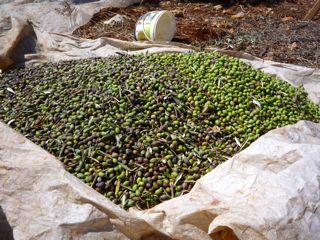
My journey began before I'd heard of Being Peace; it began with a picture in a library in a meditation
centre in Devon called Gaia House. It began with a picture of people picking olives. And it's probably important to say that it began with a decision that made no intellectual sense to me. I had no idea why I was really going.
If you're thinking of going on the retreat yourself, I'm hoping this might reassure you.
On the last day of the retreat, I saw a poster of a group of people picking olives. The poster said 'Being Peace 2010: a retreat in
Israel and Palestine'.
And that was it. I saw the poster, and I knew I had to go.
In the weeks that followed, I began to feel the fear. I'm not a political activist, I thought. I don't know anything about Israel or
Palestine. I've barely discovered meditation and spiritual practice. Who am I to think I could 'be peace'? I'm frequently overcome with violent fury if someone cuts me up in a supermarket queue – how can I contribute to peace in
the Middle East?
With all these thoughts, fears and reasons to stay home watching X Factor rushing through my mind, I followed the still, small voice of calm in my heart and did the only thing anyone should do in such moments
of doubt.
I did it anyway.
-:-:- click button again to hide -:-:-
And from the moment I arrived, I knew that this place, this time, with these people, was exactly where I was meant to be.
There is a Zen in picking olives; an in-the-moment presence where small, green fruits fall one-by-one
through your fingers, while the sun blazes through the shade of the trees from the centre of its bright, blue sky. There is a sense of family in being welcomed by Palestinians who, compared to my life back home, have little
to share, but share it all, without question. There is an intimacy of communication that only comes when you do not share a language, when you are required to share only your humanity. And there is a sense of community in sharing
a home with over a dozen other people, sharing food, time, tears and laughter, as we did in our four days living in a Palestinian village of Dir Istya.
 Olive picking brought us to the ever-inspiring presence of Rabbis for Human Rights an organisation that
helps Palestinians in the West Bank to access their land and to harvest their olives, as well as launching countless legal battles on their behalf to check the illegal spread of settlements. We met Yehiel, my very first 'real-life'
rabbi, who took us to harvest olives close to settlements, where without an international presence, Palestinian villagers would struggle to harvest their olives for fear of threat or harm from nearby settlers.
Olive picking brought us to the ever-inspiring presence of Rabbis for Human Rights an organisation that
helps Palestinians in the West Bank to access their land and to harvest their olives, as well as launching countless legal battles on their behalf to check the illegal spread of settlements. We met Yehiel, my very first 'real-life'
rabbi, who took us to harvest olives close to settlements, where without an international presence, Palestinian villagers would struggle to harvest their olives for fear of threat or harm from nearby settlers.
The gentleness
of our days in the olive groves taught me that life in a conflict zone could contain more peace than I had ever known at home. Our harvesting olives did not bring peace to Palestine, but it brought moments of peace to us, or
perhaps it brought us to peace - a peace that would prepare us for the conflict we would meet more closely in other parts of the retreat. The quiet strength of the families we met inspired a strength in us, and a commitment
to bring peace, no matter how challenging we found it, to our experiences in Israel and the West Bank.
Let me be clear. A commitment to 'being peace' did not always mean we felt peaceful. Many of us struggled to be with
moments of anger, fury, hopelessness or despair. I learnt that a commitment to peace is not about being 'beyond' these experiences, but about learning to be in them; to occupy the emotions without allowing them to occupy us,
or to be all that we are.
The beauty of the retreat is that in order to learn how to do this, Nathan and Zohar took us to very difficult situations. And before you think they're complete masochists, to ensure that we
would not be completely overwhelmed by the things we saw, they introduced us to people who were themselves working towards the same goal – how to negotiate peace, not only in the world, but inside themselves. Or perhaps there's
really no difference between the two.
The 'Being Peace' Gurus
Although I'm calling them gurus, the people we met were so remarkable mostly because they weren't remarkable at all. They could be you or me, just 'ordinary
people'. What had drawn many of them to the struggle for peace was often the worst kind of tragedy: the loss of brothers, sisters, or children.
We met Ali Abu Awwad and Alison Ramer, a Palestinian peace activist and
a Jewish American woman, who work together with the men and women of a village called Nebi Saleh. In the face of violence from nearby settlers, the village is committed to maintaining a non-violent resistance to the occupation
- to the violence of nearby settlers and the actions of an army more trained in conflict than in peace. Many of the villagers, including young people, have been arrested, many have experienced terrible violence. From their
village, they watch the growth of an illegal settlement that claims their land, their olive trees and most recently, a spring of historical importance to their village.
Standing on a hillside with mother, wife and peace
activist, Monall Timini, we looked over at the settlement. She told me that she wanted to bring peace to the village and to Palestine, because her children have nightmares about the soldiers, because she is afraid that more
villagers will be hurt, or will die and because she does not want any more of the village houses to be demolished. I stared at her in amazement, feeling so much anger in my heart. Yet my anger was swiftly silenced by Monall,
whose daily life and safety is affected by the conflict in ways I can barely imagine.
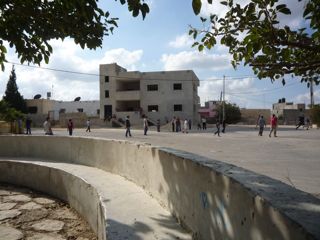 With all she experiences in her daily life, who am I to be angry? And where does this anger come from?
With all she experiences in her daily life, who am I to be angry? And where does this anger come from?
I've always told myself that the anger I feel in the face of injustice is a kind of righteous anger, a right response to suffering. Yet within my daily meditation, I found myself revisiting memories of my own past and
a childhood that bore the marks of a different kind of violence and conflict. Was there really a difference between this 'righteous' anger and my own, old anger at a past long gone? When I reacted with anger at the injustices
in Palestine, was I really just keeping alive old feelings of conflict that I struggle to resolve?
I didn't find easy answers to these questions, either in meditation or in our experiences of the conflict. Instead, I
began to find a growing sense of faith in peace, not as a solution, but as a process – a journey that is always beginning, and that has no clear end. As I began to move away from the desire for solutions or resolutions, I began
to engage with the complex reality around us. I began to confront my own desire to find a 'bad guy' in the conflict; my desire to blame the Israelis, or the settlers, or the soldiers.
Again, during my daily meditation
practice, I began to wonder if my desire for a 'bad guy' outside myself was really to do with keeping at bay the 'bad guy' inside me: the inner dark self that Dr Kubler-Ross has referred to as the 'Hitler inside'.
This
was a lesson that would come back to me many times, but most powerfully in our encounter with an organisation called Breaking the Silence, founded by former soldiers who seek to educate the Israeli public about the reality
of the occupation and to challenge the constant flow of young men and women sent there for compulsory national service. Breaking the Silence took us to Hebron, known as the 'ghost town' and the only city in the West Bank to
have a settlement at its very centre.
Our tour of Hebron found us surrounded by Israeli soldiers, who are prohibited from intervening in frequent violence from the settler community towards Palestinian residents, but
who often feel a deep-seated unease and despair about their role in their West Bank. Breaking the Silence bears witness to the complex feelings of guilt, power and despair experienced by male and female soldiers, many of them
aged between 18 and 21 years undertaking their compulsory national service. Their testimonies reveal the incomprehensible power granted to these men and women, and the danger of putting such power in the hands of any human
beings, let alone ones so young and inexperienced. As one soldier revealed in his testimony, "This is the most revolting sentence that…has the most negative connotations in the world, and you'll hear almost every soldier
speak: 'I'm a soldier and I'm just following orders.'"
We met another former Israeli soldier alongside former Palestinian resistance fighters, all now united in the group Combatants for Peace. CfP work together to educate people about the reality of the conflict and encourage both
sides to work together to bring peace to Israel and Palestine. One of the Palestinian men told us about how his brother was shot and killed by an Israeli soldier. He became a resistance fighter and ended up in prison. He spoke
of his anger, and he spoke of the birth of his daughter, and how, with her came a realisation that violence could never bring peace. He joined CfP and discovered for himself the power of meeting 'the other side'; how quickly
this brought all sides to an understanding of each other's humanity. From CfP I learned how hard it is to hate someone once you see their pain, their fear and their suffering and you see that it is a mirror to your own.
 We met Issa Suf, a man who was shot and paralysed in his village by an Israeli soldier in 2001,
while peacefully demonstrating against the occupation. Issa talked to us about his despair not only at the conflict within Israel and Palestine, but at the conflicts all over the world, the inequalities in power and resources
that lead so many of us to live in privilege at the expense of others whose faces we never see and whose names we will never know.
We met Issa Suf, a man who was shot and paralysed in his village by an Israeli soldier in 2001,
while peacefully demonstrating against the occupation. Issa talked to us about his despair not only at the conflict within Israel and Palestine, but at the conflicts all over the world, the inequalities in power and resources
that lead so many of us to live in privilege at the expense of others whose faces we never see and whose names we will never know.
Because of the conflict, Issa will never walk again, yet he wrote a letter to the soldier
who shot him, in which he said, "Even though I have reason to hate you, I do not feel that way."
Issa's life has been changed forever by the conflict, but he has found enough peace in his heart to spend his
days still striving for peace as a journalist, by welcoming internationals and Israelis into his home and by sharing his unique perspective on the importance of peace and of justice in a world where both often seem to be in
short supply.
And on the last full day, we met settlers.
In the days before our meeting, the very word 'settler' had come to cast a long, dark shadow over my experience of the retreat. The word had taken on a sense
of fear and repugnance. When I learnt that we were to meet with settlers, I both dreaded the meeting and gravitated toward it with the fascination one might feel at staring at a corpse. I sensed it would be horrible and shocking,
but I had to see. The more I concentrated on this feeling, the more I realised that I was still looking for a perfect 'bad guy'. I wanted the settlers to be monsters.
The settlers we met were from an organisation called
Eretz Shalom, a group of settlers from various settlements within the West Bank who meet with Palestinian villagers. Their leader, Nahum, spoke to us about their rejection of the prevailing politics of left and right, and their
desire, instead to live as neighbours with the Palestinians.
Within seconds of their arrival, I knew that Eretz Shalom were not monsters. They wanted the same things our friends in Palestine wanted: safety for their children,
a peaceful life, the freedom to make choices about their jobs, their families and their futures without needing to consider if those choices would turn out to be life-threatening. I did not always agree with their perspective,
but I had learned enough from my time on the retreat to know how important it was to sit in a spirit of understanding, despite my misgivings, and to recognise the humanity of these people, their desire for a life lived in peace.
So what exactly did I learn from the retreat?
I learned that peace is just a word, but that connecting with a sense of peace is not an end result – and not one that could ever be fought for – it is a process. Overcoming
anger, vengeance, hopelessness and despair in order to find peace is not a goal you can decide to achieve in a conventional sense. It is a moment that comes at the end of many long moments in which you have struggled to hold
on to your sense of self, to your sense of sanity, to your sense of hope. Peace cannot be achieved alone because none of us live in this world alone and each one of our actions can disturb the peace others, even when we think
we are acting in the spirit of the divine. Peace is what happens when you can open your heart to others - as often and as far as you possibly can – and peace is what happens when someone else opens their heart to you and you
see it is a mirror of your own.
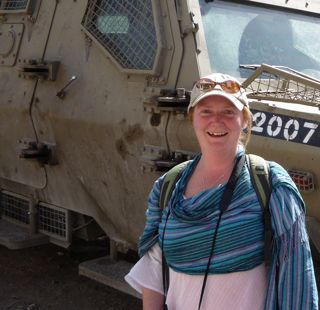 Like the Palestinians we met, I grew up with violence, fear and conflict, but of a very different kind.
I left the violence in my life and moved on, but for the people of Palestine and of Israel, this is only possible if they leave their whole lives, their homes, their countries. Instead they stay, and they dream of peace and
a number of them – more, I think, than we can possibly know – reach out, across the wall, not just the towering and terrifying wall that has become a symbol of the occupation, but across the walls inside their own hearts. It
is not easy, it is often terrifying, it requires a faith and a hope that I can barely begin to grasp. But I learnt, most of all, that it is this moment, this act of reaching out, which is the true beginning of peace.
Like the Palestinians we met, I grew up with violence, fear and conflict, but of a very different kind.
I left the violence in my life and moved on, but for the people of Palestine and of Israel, this is only possible if they leave their whole lives, their homes, their countries. Instead they stay, and they dream of peace and
a number of them – more, I think, than we can possibly know – reach out, across the wall, not just the towering and terrifying wall that has become a symbol of the occupation, but across the walls inside their own hearts. It
is not easy, it is often terrifying, it requires a faith and a hope that I can barely begin to grasp. But I learnt, most of all, that it is this moment, this act of reaching out, which is the true beginning of peace.
For me, I reached out when I saw that poster. I didn't know why, I didn't know what it would bring and I could think of so many perfectly justifiable reasons not to go. But I did. And now my life will never be the same. Because,
since I came home, when I feel the spark of anger that comes for reasons large and small, I find myself back on a hillside in the West Bank, listening to a woman who is afraid for her children, whose home is being threatened,
who has watched people she loves being beaten, imprisoned or killed, and I remember that being peace is not about 'solving' the 'problem' of anger, or despair. It is about feeling suffering and then choosing to open your heart,
against all odds, to reach out. And it can take endless forms – you can reach out when you sign a petition, you can reach out with a kind word, or you can stop reading this and press that button and book your place on Being
Peace.
And then you can find out for yourself.
 I was really looking forward to a week of peacefulness, and gentle company and tasks, and I got what I wished
for. The surroundings were beautiful, the added extras like the swimming pool and chanting round the camp fire were real gifts. The schedule was relaxing and peaceful. Working in the garden was a pleasure and the other tasks and
workshops made for an enjoyable variety, with a good amount of meditation in the tranquil hall. Eating outside every night was a real treat and it felt more like being in France than Devon.
I was really looking forward to a week of peacefulness, and gentle company and tasks, and I got what I wished
for. The surroundings were beautiful, the added extras like the swimming pool and chanting round the camp fire were real gifts. The schedule was relaxing and peaceful. Working in the garden was a pleasure and the other tasks and
workshops made for an enjoyable variety, with a good amount of meditation in the tranquil hall. Eating outside every night was a real treat and it felt more like being in France than Devon.
Blessed with lovely company I
really enjoyed the week and would definately recommend it!
Claire Deaves
 The SanghaSeva retreat in South Africa was a rich, challenging, nourishing, inspiring and profoundly
moving experience on many levels. The combination of the physical work in the gardens in Mqatsheni, time on retreat at Dharmagiri, and walking in the Drakensberg, was immensely satisfying and enjoyable, though at times heart-breaking
to see the poverty and illness that people are facing there. It was a privilege to be able to offer some support to the excellent work of the Khuphuka team.
The SanghaSeva retreat in South Africa was a rich, challenging, nourishing, inspiring and profoundly
moving experience on many levels. The combination of the physical work in the gardens in Mqatsheni, time on retreat at Dharmagiri, and walking in the Drakensberg, was immensely satisfying and enjoyable, though at times heart-breaking
to see the poverty and illness that people are facing there. It was a privilege to be able to offer some support to the excellent work of the Khuphuka team.
Jenny Wilkes

We prepared for the retreat by spending two days at Dharmaghiri Heritage. These precious days were a mixture of learning about the people and place, meditation, and a dharma focus on compassion. It was also a chance for retreatants
to get to know each other more deeply than casual acquaintance might allow. Throughout the working week we continued to sit early and in the evening, to chant the Kwan Yin mantra of great compassion, and to chant [some of us] or
try to chant [most of us] other mantras.
This careful planning by the retreat leaders meant that we were able to approach our work with open hearts, to meet with the people of Mqatsheni and to recognise their humanity, their striving, their joy at the same time
as we recognised their daily struggle to live, to be well.
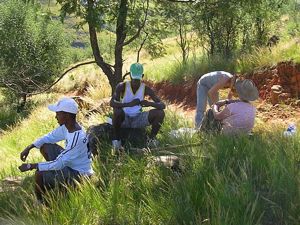 My own sense is that we met as human beings before we met as visitors/hosts, or gardeners/recipients....and
there was a great mingling of gardeners, as the young men and women community volunteers outnumbered the visitors.
My own sense is that we met as human beings before we met as visitors/hosts, or gardeners/recipients....and
there was a great mingling of gardeners, as the young men and women community volunteers outnumbered the visitors.
Perhaps my strongest single memory is the braai [barbecue] with which we celebrated the successful creation of veg gardens....though we each [community and volunteers] sang our separate songs , the event felt like the personification
of dana, a mutual giving and receiving without distinction.
Di Bligh